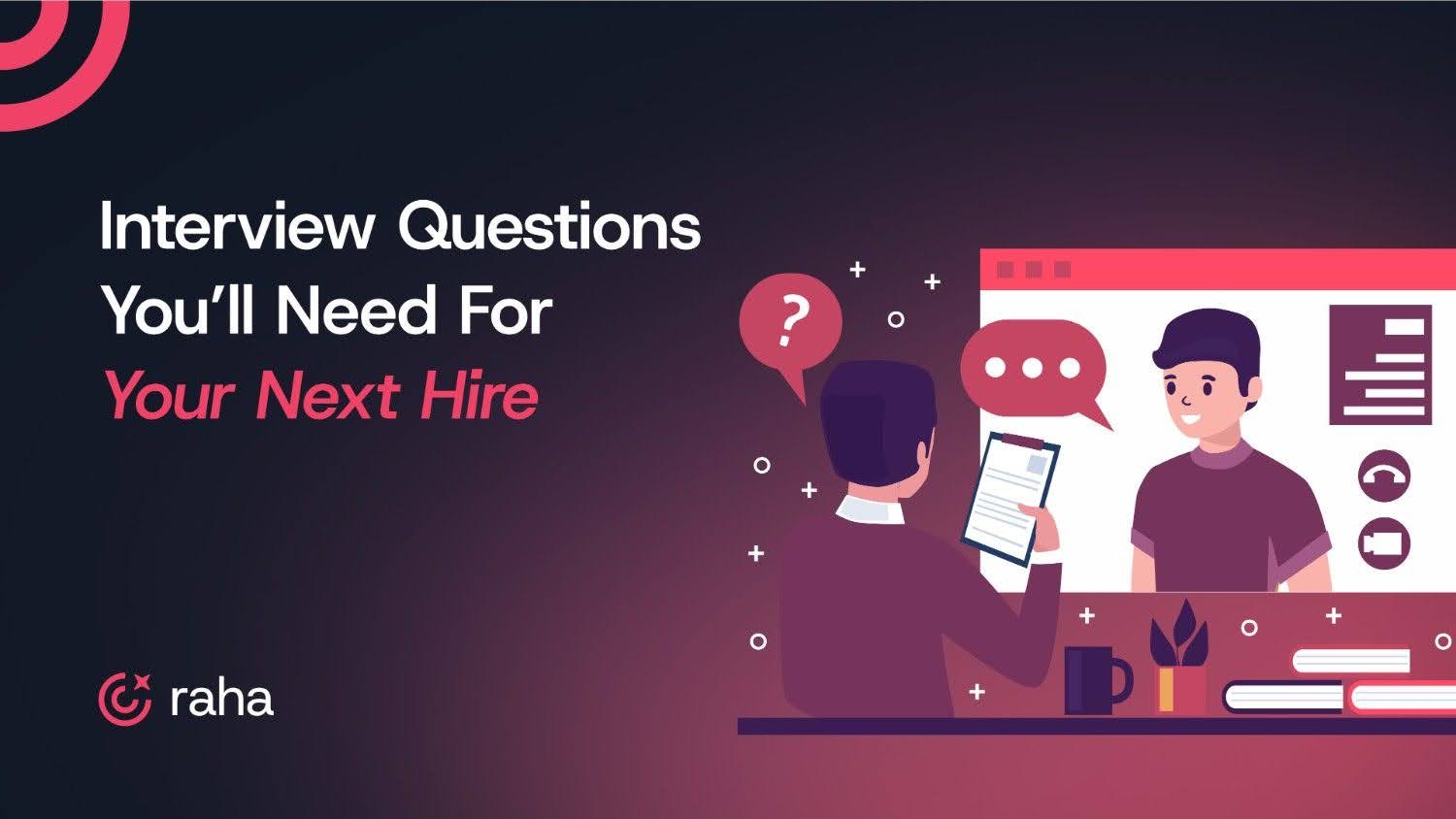
You know the pressure: multiple roles to fill, hiring managers checking in constantly, and candidates who look great on paper but fall short in execution.
Even with hours spent on interviews, the wrong hire still slips through. This can be frustrating and expensive.
According to the U.S. Department of Labor, it can cost up to 30% of an employee’s first-year earnings. In high-stakes or leadership roles, some estimates go as high as $850,000.
And that’s before you account for the hit to morale, velocity, and team trust.
This is simply because most interviews aren’t designed to predict real performance. They check boxes and reward polish but miss the signals that actually matter.
In this blog, we’ll walk through the most effective interview questions to ask candidates, from behavioral to role-specific questions.
Key Takeaways:
- Generic interviews miss real performance signals and lead to costly mis-hires.
- Start with clear outcomes for the role. Don't build questions off vague job descriptions.
- Ask questions that show how candidates think and solve problems, not just what they’ve done.
- Structured interviews make it easier to compare candidates and reduce bias.
- It’s not about asking more questions. It’s about asking the right ones.
Start with Understanding the Role Requirements
You can’t ask the right questions if you don’t know what the job actually demands.
Before you jump into interview prep, take a step back and get painfully clear on the outcomes this role is expected to deliver. You need to think beyond the responsibilities listed in the JD, focus on the real impact this person needs to have in their first 6–12 months.
Because vague requirements lead to vague questions, and such questions lead to wrong hires.
Start by asking:
- What are the must-haves vs. nice-to-haves?
- What would make someone succeed in this role at your company, not just in theory?
- What are the top 3 things this person will be measured on?
Once you have that locked, build your interview questions around those success signals. The goal here is to surface the real stuff: how they think, how they solve, how they operate when things don’t go to plan.
Get the role definition right, and every question that follows becomes sharper, faster, and more predictive.
To help you cover all the right angles, we’ve broken down the most effective interview questions into five categories—each designed to uncover something critical to making the right hire.
Role-Specific and Technical Questions
Before you get into goals or cultural fit, you need to assess whether the candidate can handle the real demands of the role. Focus on how they think, how they solve problems, and how they work when things don’t go to plan.
Here are the most effective interview questions to evaluate skills and role fit.
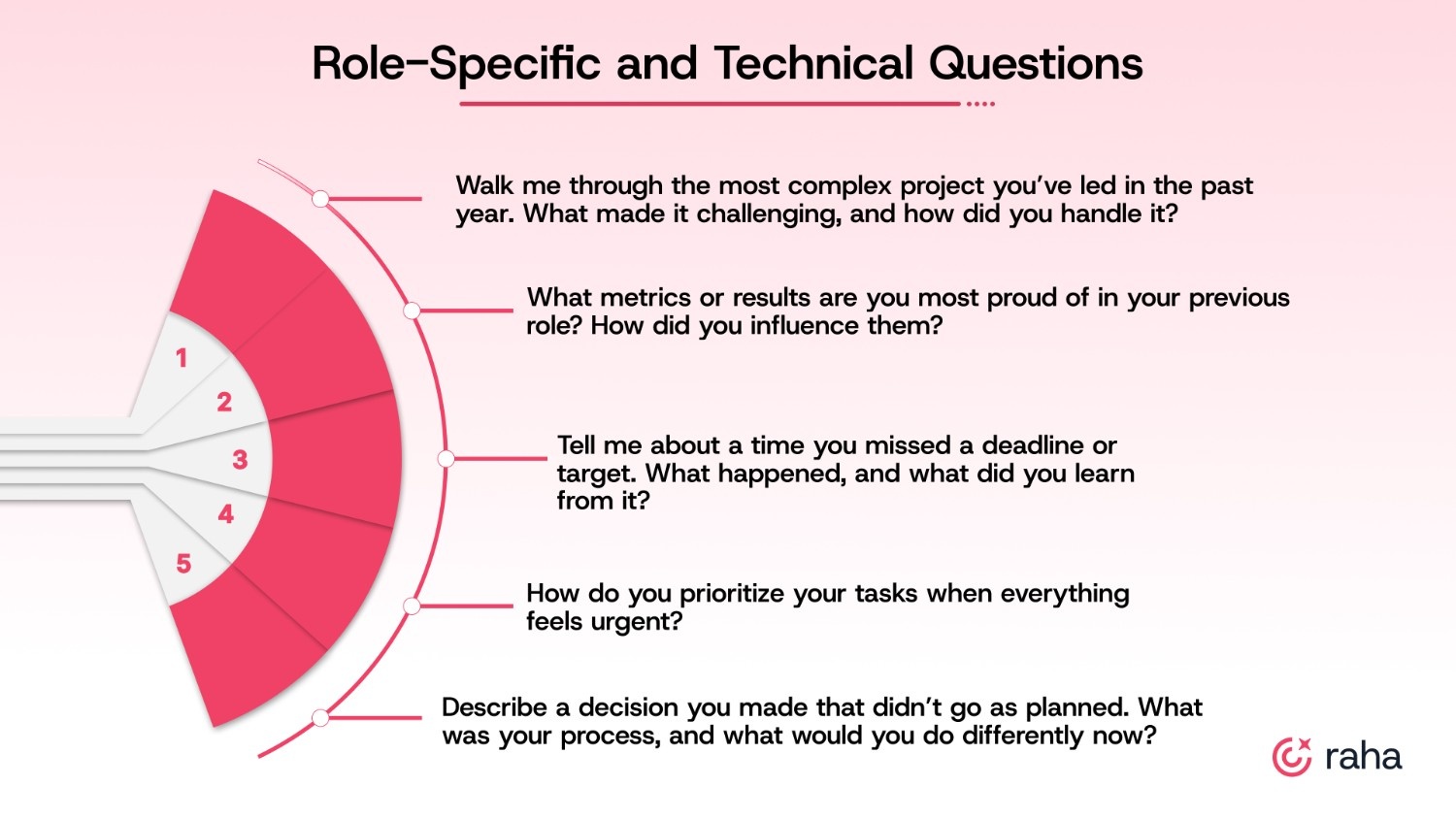
1. Walk me through the most complex project you’ve led in the past year. What made it challenging, and how did you handle it?
What you’re testing:
- Problem-solving
- Ownership
- Project management
2. What metrics or results are you most proud of in your previous role? How did you influence them?
What you’re testing:
- Results orientation
- Strategic thinking
- Awareness of impact
3. Tell me about a time you missed a deadline or target. What happened, and what did you learn from it?
What you’re testing:
- Accountability
- Learning mindset
- Ability to self-correct under pressure
4. How do you prioritize your tasks when everything feels urgent?
What you’re testing:
- Time management
- Judgment
- The ability to work in fast-paced or ambiguous environments
5. Describe a decision you made that didn’t go as planned. What was your process, and what would you do differently now?
What you’re testing:
- Decision-making process
- Humility
- Adaptability

Problem-Solving and Critical Thinking
Resumes show outcomes. Interviews should show how candidates think. This category helps you assess their approach to complex problems, how they weigh trade-offs, and how they operate when there’s no clear answer.
Here are the top interview questions to assess real-world thinking and judgment:
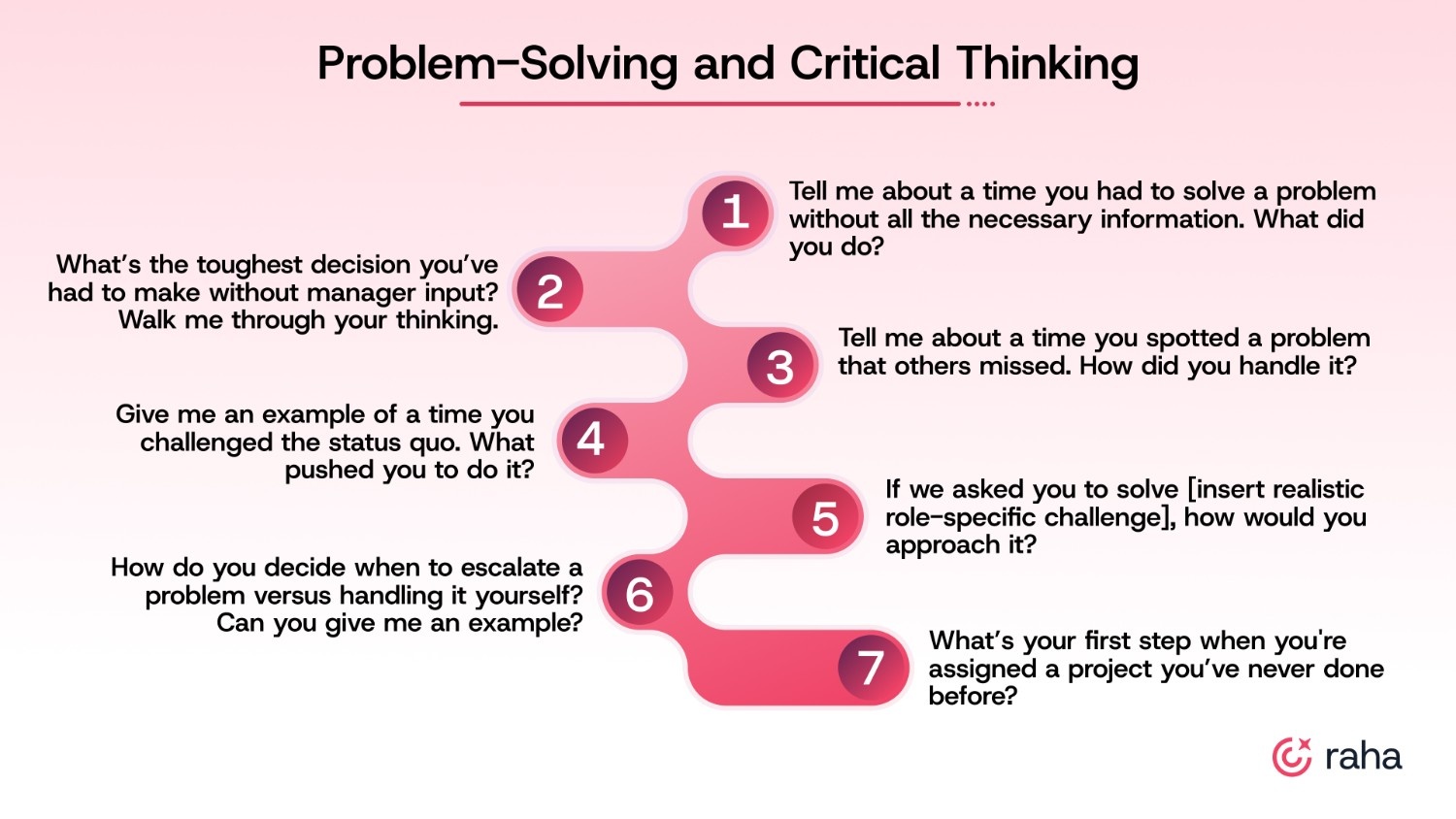
6. Tell me about a time you had to solve a problem without all the necessary information. What did you do?
What this tells you about the candidate:
- Comfort with ambiguity
- Ability to structure a messy challenge
- Risk assessment and decision-making under uncertainty
7. What’s the toughest decision you’ve had to make without manager input? Walk me through your thinking.
What this tells you about the candidate:
- Ownership
- Independent judgment
- Confidence in their process
8. Tell me about a time you spotted a problem that others missed. How did you handle it?
What this tells you about the candidate:
- Proactive risk identification
- Systems thinking
- Courage to speak up
9. Give me an example of a time you challenged the status quo. What pushed you to do it?
What this tells you about the candidate:
- Critical thinking
- Proactive mindset
- Courage to speak up with logic and tact
10. If we asked you to solve [insert realistic role-specific challenge], how would you approach it?
Example: “If we were losing users at onboarding, how would you diagnose the problem?”
What this tells you about the candidate:
- Real-time thinking
- Structured problem-solving
- Ability to apply experience in your context
11. How do you decide when to escalate a problem versus handling it yourself? Can you give me an example?
What this tells you about the candidate:
- Judgment
- Self-awareness
- Understanding of team dynamics and ownership boundaries
12. What’s your first step when you're assigned a project you’ve never done before?
What this tells you about the candidate:
- Learning agility
- Research and planning habits
- Initiative when facing the unknown
Collaboration & Communication
Strong individual skills don’t mean much if a candidate can’t work well with others. This set of questions reveals how they communicate, manage conflict, and adapt to different working styles.
Here are the best interview questions to evaluate collaboration and communication skills:
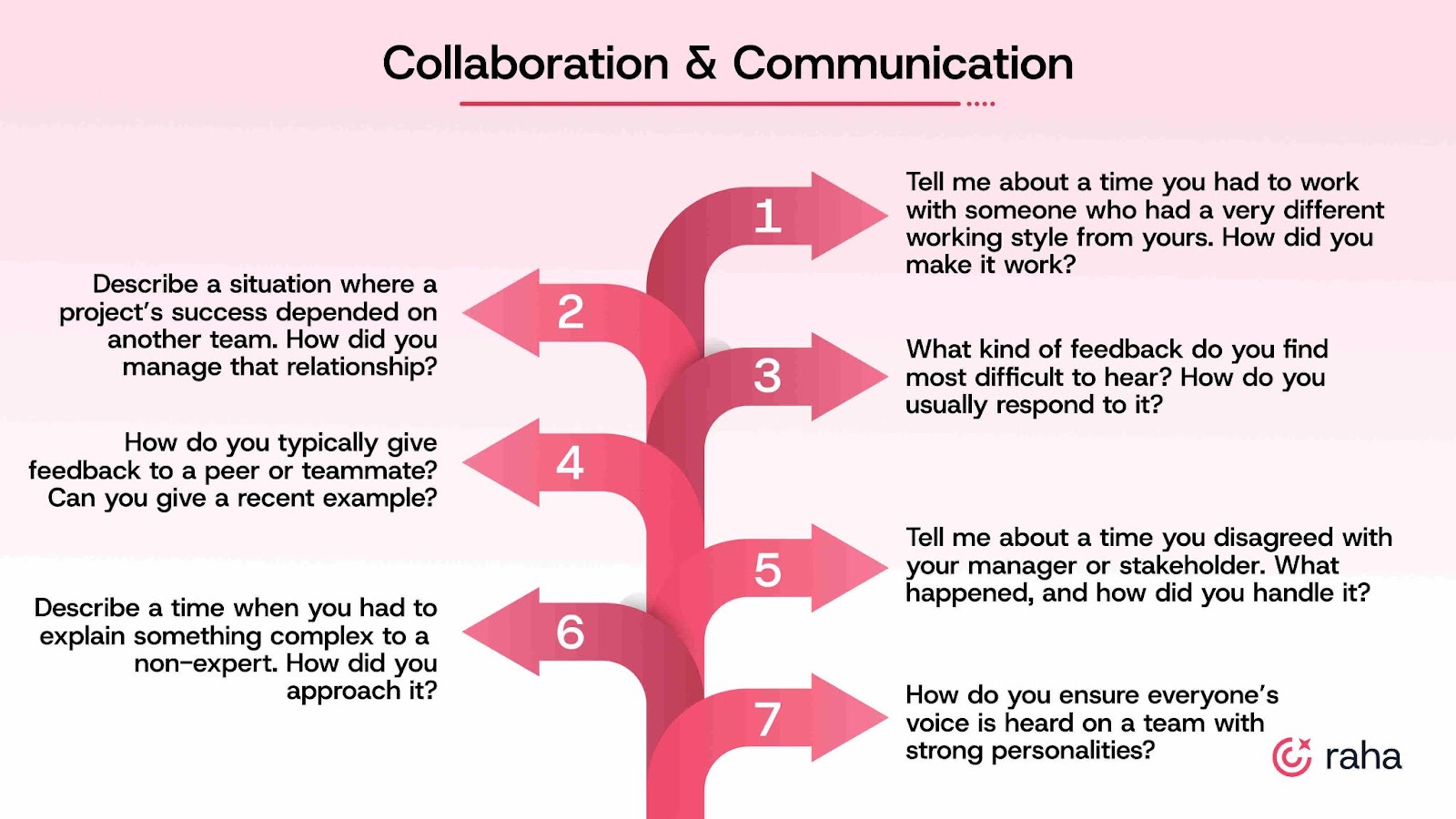
13. Tell me about a time you had to work with someone who had a very different working style from yours. How did you make it work?
What this shows:
- Flexibility
- Self-awareness
- Collaboration under friction
14. Describe a situation where a project’s success depended on another team. How did you manage that relationship?
What this shows:
- Cross-functional coordination
- Influence without authority
- Communication clarity
15. What kind of feedback do you find most difficult to hear? How do you usually respond to it?
What this shows:
- Coachability
- Emotional intelligence
- Growth mindset
16. How do you typically give feedback to a peer or teammate? Can you give a recent example?
What this shows:
- Communication style
- Constructive feedback delivery
- Respect for team dynamics
17. Tell me about a time you disagreed with your manager or stakeholder. What happened, and how did you handle it?
What this shows:
- Conflict management
- Stakeholder alignment
- Professional maturity
18. Describe a time when you had to explain something complex to a non-expert. How did you approach it?
What this shows:
- Ability to simplify
- Empathy for the audience
- Clarity under pressure
19. How do you ensure everyone’s voice is heard on a team with strong personalities?
What this shows:
- Inclusion mindset
- Situational awareness
- Facilitation skill
Motivation, Values & Long-Term Fit
Any decent candidate can prep for the job description. So try to look beyond that — into patterns, decision-making signals, and red flags that show whether this person will thrive here, now, and for long enough to matter.
Here are the questions that experienced TAs lean on to dig deeper:
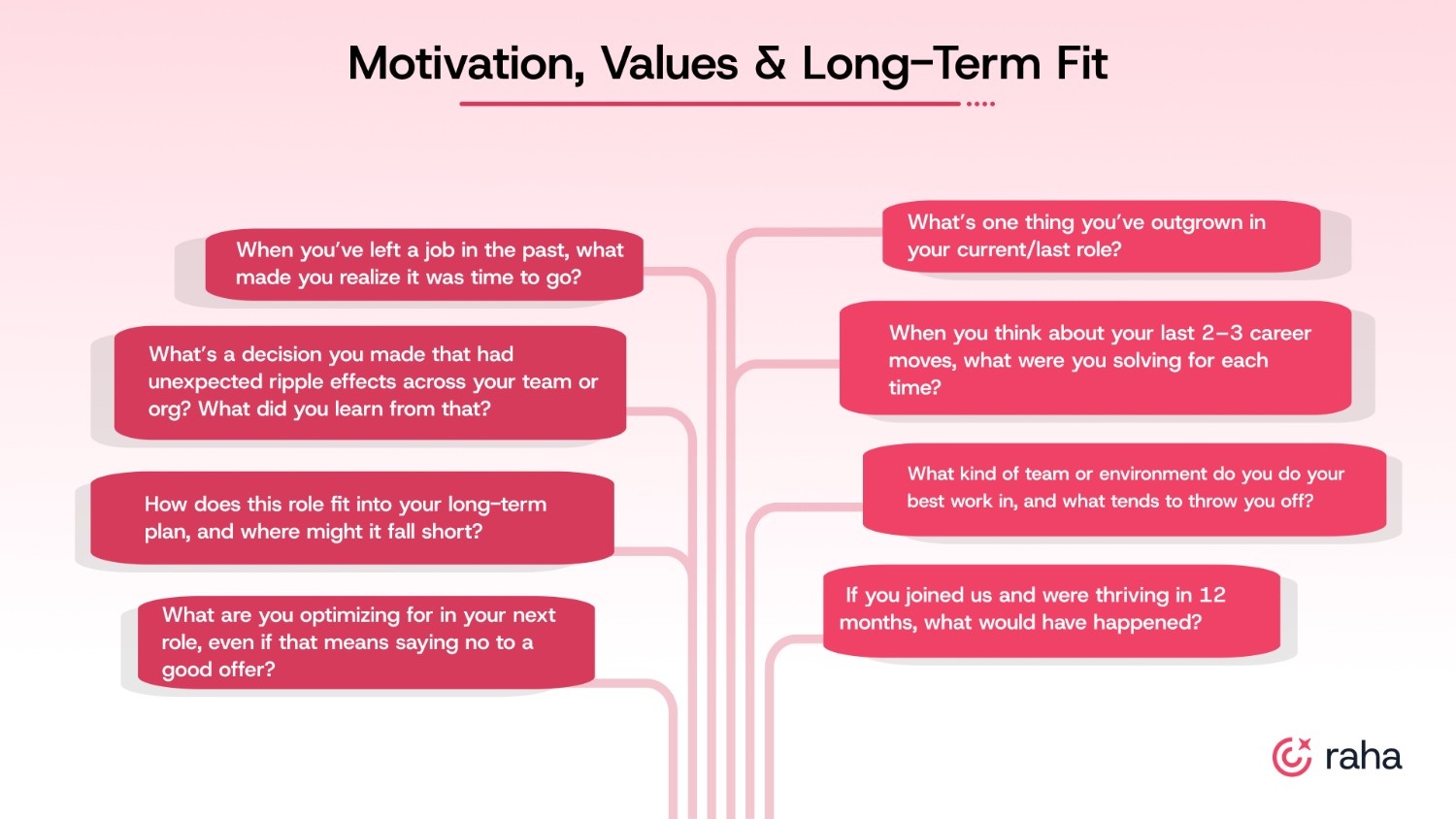
20. When you think about your last 2–3 career moves, what were you solving for each time?
What this shows:
- Decision-making logic over time
- What drives their job changes (push vs. pull factors)
- Repeat patterns that may lead to early attrition
21. What’s one thing you’ve outgrown in your current/last role?
What this shows:
- Self-awareness about current limitations
- Signals about what they’ll need next
- Whether your role actually provides that stretch
22. What kind of team or environment do you do your best work in, and what tends to throw you off?
- What this shows:
- Culture and team fit
- Situational self-awareness
- Mismatch risks
23. If you joined us and were thriving in 12 months, what would have happened?
What this shows:
- How do they define success
- Whether their goals align with your org’s roadmap
- Realistic vs. idealistic expectations
24. What are you optimizing for in your next role, even if that means saying no to a good offer?
What this shows:
- Deal-breakers, they may not state upfront
- What will make them stay or leave
- Strategic career intent
25. How does this role fit into your long-term plan, and where might it fall short?
What this shows:
- Whether this role is a stepping stone or a stopgap
- How much clarity do they have about their career arc
- Whether there’s enough headroom to retain them
26. When you’ve left a job in the past, what made you realize it was time to go?
What this shows:
- Patterns behind past exits
- Risk of early attrition
- Whether your current role replicates any of those triggers
27. What’s a decision you made that had unexpected ripple effects across your team or org? What did you learn from that?
What this shows:
- Systems thinking
- Self-awareness of downstream impact
- Learning from complexity

Career Trajectory and Growth Potential
You’re hiring someone who’ll grow with the business, take on bigger challenges, and stay invested. This category uncovers how candidates think about their own growth, how proactive they are in shaping it, and whether your company can support their trajectory.
Here are the best interview questions to evaluate long-term potential and a growth mindset:
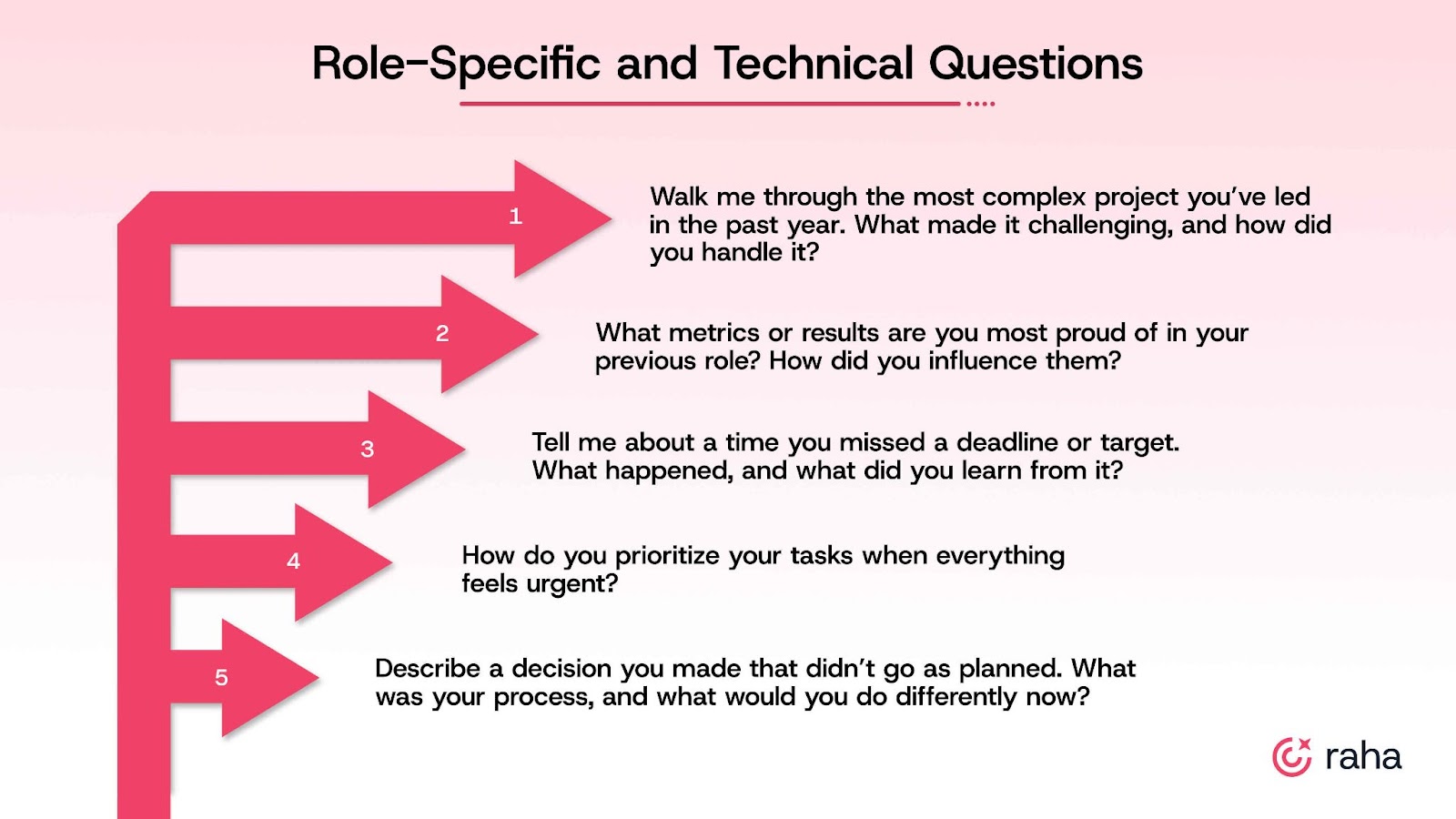
28. How has your role evolved in the last 1–2 years? What drove that change?
What this tells you about the candidate:
- Proactiveness in growth
- Openness to change
- Evidence of upward trajectory
29. What skills are you actively trying to develop right now, and why?
What this tells you about the candidate:
- Self-awareness
- Learning mindset
- Alignment with future role needs
30. Tell me about a time you asked for more responsibility. What happened next?
What this tells you about the candidate:
- Initiative
- Drive for impact
- How do they handle stretch
31. What kind of role do you see yourself in two years from now?
What this tells you about the candidate:
- Long-term goals
- Role alignment
- Whether your company can realistically support that path
32. When was the last time you failed at something new? How did you bounce back?
What this tells you about the candidate:
- Growth resilience
- Risk-taking attitude
- Emotional maturity
How AI Can Improve Your Interview Process
Interviewing is one of the messiest parts of hiring — full of back-and-forth emails, inconsistent screens, and slow decisions. AI helps you bring structure and speed without losing the human signal. Here’s where it makes the biggest difference:
1. Screen Faster Without Losing Quality
Resume screening is where speed often kills precision. AI helps you scan hundreds of resumes quickly, but with structure, pulling out relevant skills, work history, and signals of fit based on the job description.
Raha’s AI Resume Screener parses resumes, scores candidates for fit, and shortlists top profiles instantly so that your list reflects who can actually do the job.
2. Run Consistent, Bias-Free First-Round Calls
Instead of relying on subjective first impressions, AI-led screening calls ensure every candidate is asked the same core questions and evaluated against the same criteria.
Raha’s AI Interviewer conducts the first screening call for you, asks 7–10 fit-check questions, and returns a full transcript and evaluation so that you can compare everyone based on the same criteria.
3. Eliminate Scheduling Back-and-Forth
One of the biggest time drains in recruiting is calendar ping-pong. AI tools integrated with your ATS and calendar can handle the entire scheduling process, such as syncing availability, following up, and even rescheduling automatically.
Raha’s AI Interview Coordinator takes care of interview scheduling from start to finish — no back-and-forth, no manual emails.
4. Capture Better Interview Feedback
AI can support structured feedback collection post-interview, prompting interviewers to rate specific competencies, leave qualitative notes, and avoid recency bias. This leads to faster, clearer hiring decisions.
5. Spot Patterns That Lead to Better Hires
AI can help you analyze interview outcomes over time, which questions are most predictive, where candidates drop off, and what top performers had in common during their interviews. That’s how you continuously improve.
Ready to Improve Your Interview Process?
Now that you’ve got the right questions to ask, it’s time to put them into practice. The best interviews reveal who can actually do the job, thrive in your team, and grow with your company.
And with Raha AI you can get there faster.
From resume screening to structured first-round interviews and fully coordinated scheduling, it handles everything so you can focus on making the best hire.
Book your demo to get started!
FAQs
1. How do I structure an interview to get the best insights from candidates?
Focus on asking core questions that align with the role’s requirements. Keep the interview structured, but be flexible to follow up on interesting answers. Active listening is key; let candidates expand on their thoughts, and don’t rush them.
2. How can I assess a candidate’s cultural fit in an interview?
Ask questions that explore how candidates handle feedback, collaborate with others, and align with your company’s values. For example, "How do you handle conflict in a team?" can give you valuable insights into their cultural alignment.
3. What’s the importance of situational questions in interviews?
Situational questions help assess how candidates would respond to hypothetical challenges they may face in the role. This tests their problem-solving skills and decision-making process, ensuring they’re equipped to handle real-world scenarios.
4. How can technology make interviews more efficient?
Tools like Raha AI streamline scheduling, standardize interviews, and gather feedback quickly, saving time and reducing bias. Automated scheduling and video interviews make the entire process more flexible and efficient.
5. How can I avoid biases during interviews?
Stick to a structured interview process, ask all candidates the same core questions, and focus on objective data points. Being aware of your biases and evaluating candidates based on their skills and fit for the role is crucial for fair hiring.

